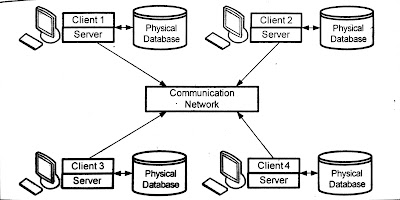Database management systems can be classified based on several
different criteria. These criteria are given below:
1. Based on data models (Data models):
DBMS
|
Underlying
Data Model
|
Relational
(RDBMS)
|
Relational
model
|
Object-oriented
(OODBMS)
|
Object-oriented
data model
|
Network
|
Network
model
|
Hierarchical
|
Hierarchical
model
|
Object-Relational
(ORDBMS)
|
Combined
features of Object-based & Relational model
|
2. Based on number of users:
Single-user
systems:
Such types of systems support
only one user at a time.
Multi-user
systems:
Such types of systems support
multiple users concurrently.
Types of database management system and introduction to dbms
3. Based on purposes or use:
Transactional
DBMS:
Decision
Support DBMS:
Data
warehouse:
4. Based on site locations:
Centralized
DBMS (CDBMS):
Parallel
DBMS:
Distribute
DBMS:
Client/Server
DBMS:
1. Centralized database system (Centralized dbms
architecture)
The following figure illustrates the
centralized database system.
 |
| Centralized database system |
Description:
In a
centralized database system, a database is kept at single physical location.
Also,
a single processor is used to provede central control.
Different
users can access this database from local machines or from remote machines.
Advantages:
Operations
such as insert, update, delete, backup, query, recovery are easier to
accomplish.
Disadvantages:
Problems
such as system crash in central computer results in system failure, as no any
user can access the database.
All
terminals must have connection with the central computer, and this incurs cost
in networking.
2. Parallel database system (Parallel
architecture)
Description:
In a
parallel database system, a database is kept in multiple disks.
Also,
multiple processors are used.
For
parallel systems, different architectures can be used, such as –
Shared
memory
Shared
data storage disk
Hierarchical,
and
Independent
resources.
Advantages:
Can
be used to query extremely large database.
Can
be used to process large number of transactions simultaneously.
Provides
high throughput and better response time.
What is dbms? (What database management system)
Disadvantages:
Networking
costs are very high for such kind of systems.
Management
of shared resources becomes very complex.
3. Distribute database system (Distribute
architecture)
Description:
In distributed
database systems, data is spread across a variety of different databases. In other
words, database is distributed over different computers.
These
computers are connected by a communication network.
Here,
an application can operate on data which is spread across multiple databases in
different computers.
Also,
each machine can have data and applications of its own.
So,
each machine can act as a server as well as client.
The
following figure illustrates such type of system.
Figure:
Advantages:
Provides
greater efficiency and better performance.
Provides
high throughput and better response time.
Single
database can be shared across several distinct client machines.
Provides
local autonomy.
Disadvantages:
As database
is distributed, recovery from failure is more complex compared to other
systems.
4. Client/Server database system (Client/Server
dbms architecture)
Description:
Client/Server
database systems contain two components – Clients & Server.
Application
programs are kept at client side, while, database and DBMS software are kept at
server side.
The
client computers are called front-end, while, the server computer is called
back-end.
The server and
client computers are connected to a network. Clients send request to server to
access data in a database, and server returns the result according to the
request.
Figure:
Advantages:
More
flexible compared to centralized database system.
Provides high
throughput and better response time.
Database can be
shared in efficient manner.
Server contains
all the business logic, while application-client works only as a front end. So,
business logic does not need to be distributed across multiple clients.
Disadvantage:
Client/server
programming cost in high.
Security
needs to be implemented in a better way.



Post a Comment
Please do not enter any spam link in the comment box.